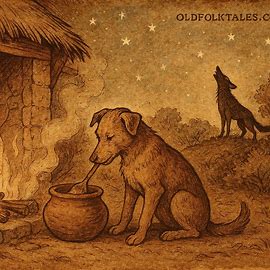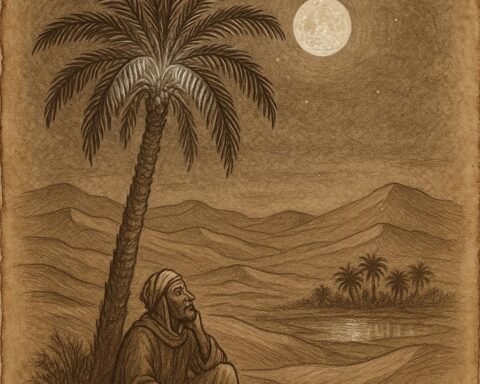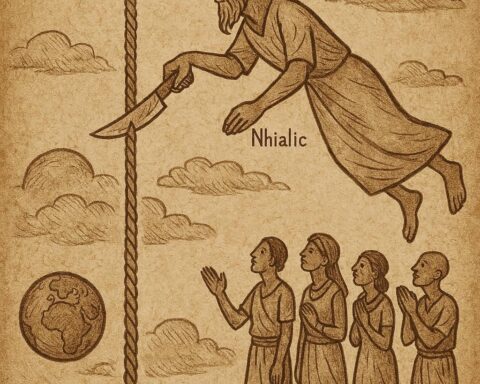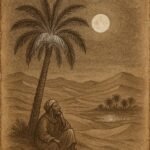Long ago, when the bushlands of Angola stretched endlessly with tall grasses and the distant cries of animals, Dog and Jackal lived as close kinsmen. They roamed together through the wild, hunting, sharing the shade of trees, and warming themselves by the fire they made with their own efforts. Dog was loyal to his companion, and Jackal trusted him. Their bond seemed unbreakable. Yet, as so many stories teach us, loyalty is often tested in unexpected ways.
One day, Jackal said to Dog, “Brother, let us feast. The locusts have swarmed the prairie, and if we burn the grass, they will scatter into our hands. Go, then, into the village and fetch fire. With it, we shall set the plains aflame and eat our fill.”
Dog, always obedient, agreed without hesitation. “I will go, cousin, and return swiftly,” he said. With that, he trotted down the narrow path that led from the bush into the land of humans.
When Dog arrived at the village, he sniffed the air and was overcome by unfamiliar scents. Smoke curled from the huts, and the smell of food drifted on the wind, rich, warm, and heavy with promise. Entering one of the houses, he found a woman seated on a mat, feeding her child from a pot of mush.
The woman looked at Dog with kindness. “Ah, poor creature of the bush,” she said softly, and continued to feed her little one. When the child had eaten his fill, she scraped the sides of the pot. Out of pity, she extended her hand and placed a share before Dog.
Hungry from his wanderings, Dog could not resist. He licked the mush eagerly, his belly swelling with warmth. Never had he tasted food so soft, so filling. In the bush, hunger had always stalked him; days often passed without a proper meal. But here, in the village, food was plentiful.
As Dog licked the last morsels from his muzzle, a thought struck him: Why should I return to the bush, where I starve, when in the village I am fed? His heart, once bound to Jackal, wavered. His stomach, full for the first time in days, had made its decision. Dog lay down by the hearth, content, and when night fell, he did not stir to return.
READ THIS: How the Hog Learned Too Late: An Angolan Folktale That Teaches Lessons on Wisdom and Heeding Advice
Meanwhile, Jackal waited in the wilderness. He prowled the edges of the prairie, scanning for the glow of fire or the sound of Dog’s return. He grew restless, then anxious, and finally desperate. Night fell, and still Dog did not come. Jackal howled into the darkness, his cry echoing across the plains.
The villagers heard his voice and said, “The Jackal howls, tway!” But they did not know his words. For Jackal was not simply howling. He was speaking in his sorrow:
“I am surprised, I, Jackal of Ngonga! Dog, whom I sent to fetch fire, when he found mush, was seduced. He stayed for good. My cousin has betrayed me. My companion has abandoned me.”
From that day, the people in the villages came to know Dog as their own. No longer did he run with Jackal in the wild. He became a creature of the hearth, guarding the huts, eating the scraps, and living among men. Jackal, left to the bush, continued to howl in remembrance of his lost kinsman.
And so it is said: Dogs were once wild, but it was the taste of mush that bound them forever to the villages of men.
Moral Lesson
This tale teaches that temptation can reshape destiny. Dog was sent on a simple errand for fire, but the promise of comfort and full stomach led him to forsake his bond with Jackal. The story reminds us that choices made in a single moment of weakness can carry consequences that last for generations.
At the same time, it shows the pull of contentment. Where hunger once ruled Dog’s life, security in the village gave him a new home. Yet, while he found comfort, he also lost his freedom and the companionship of his kin. The lesson is clear: wisdom lies in balancing desire with loyalty, and in weighing the cost of what we gain against what we lose.
Knowledge Check
Who were the two main characters in the tale?
The story features Dog and Jackal as kinsmen and companions.
Why did Jackal send Dog to the village?
To fetch fire so they could burn the grass and catch locusts for food.
What tempted Dog to stay in the village?
The mush offered by the woman, which filled his hunger and made him feel content.
What does Jackal’s howling symbolize?
His grief, surprise, and betrayal at Dog’s decision to remain in the village.
What broader lesson does the tale teach?
It warns against giving in to temptation and emphasizes the need for wisdom and loyalty.
What cultural origin does the folktale belong to?
It is an Angolan folktale.
Source: Kimbundu folktale, Angola.






